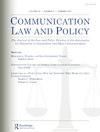Big Tech and Tying Arrangements: Are Antitrust Revisions Needed?
IF 0.2
Q4 LAW
引用次数: 0
Abstract
Abstract One area of antitrust law in which many Big Tech organizations fight antitrust lawsuits is tying arrangements. Tying arrangements, which occur when a seller requires the sale one product to be tied to the purchase of another product, are subject to the partial per se analysis introduced in Jefferson Parish Hospital District No. 2 v. Hyde. Partial per se does not automatically assume that a tying arrangement is illegal, but rather sets conditions to determine when a tie between two products is an antitrust violation. However, criticism of the partial per se standard has existed for decades. This article argues that proposed changes to antitrust laws should include changing the standard used to evaluate tying arrangements to a consistent rule-of-reason approach.大型科技公司和捆绑安排:是否需要反垄断修订?
许多大型科技公司在反垄断法中对抗反垄断诉讼的一个领域是捆绑安排。捆绑安排,即卖方要求将一种产品的销售与另一种产品的购买捆绑在一起,是杰斐逊教区医院第2区诉海德案中引入的部分本身分析的对象。Partial本身并不自动假定捆绑安排是非法的,而是设定条件来确定两种产品之间的捆绑何时是违反反托拉斯的。然而,对部分本身标准的批评已经存在了几十年。本文认为,对反垄断法的拟议修改应包括改变用于评估将安排与一致的理性规则方法联系起来的标准。
本文章由计算机程序翻译,如有差异,请以英文原文为准。
求助全文
约1分钟内获得全文
求助全文
来源期刊
CiteScore
0.60
自引率
33.30%
发文量
7
期刊介绍:
The societal, cultural, economic and political dimensions of communication, including the freedoms of speech and press, are undergoing dramatic global changes. The convergence of the mass media, telecommunications, and computers has raised important questions reflected in analyses of modern communication law, policy, and regulation. Serving as a forum for discussions of these continuing and emerging questions, Communication Law and Policy considers traditional and contemporary problems of freedom of expression and dissemination, including theoretical, conceptual and methodological issues inherent in the special conditions presented by new media and information technologies.

 求助内容:
求助内容: 应助结果提醒方式:
应助结果提醒方式:


